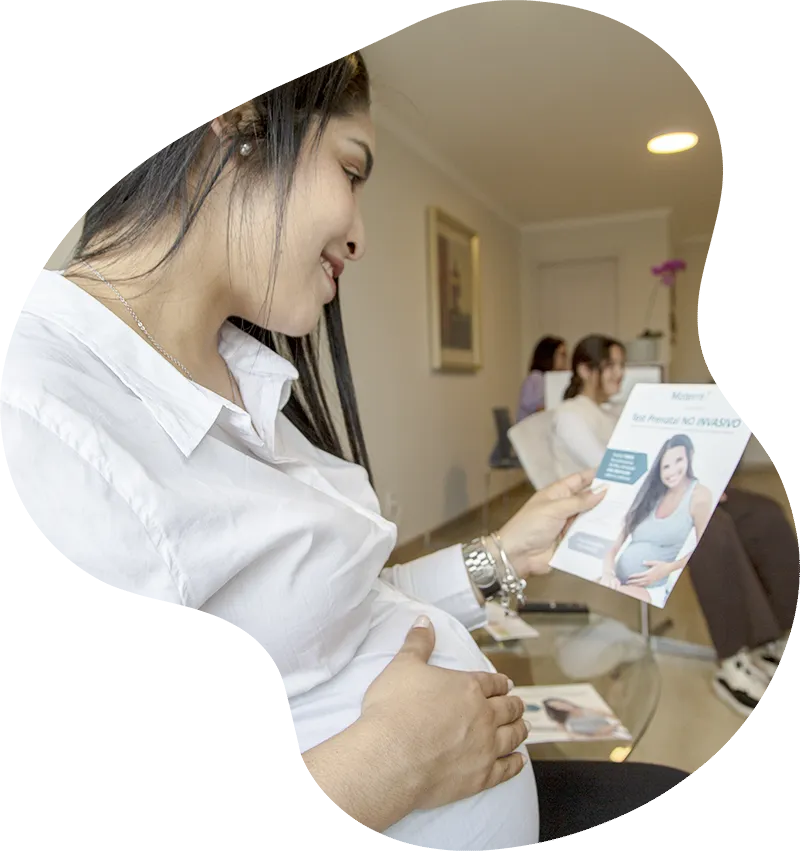
Fetal DNA in Maternal Blood
It is a non-invasive prenatal test that, from a mother's blood analysis, allows us to detect the most common chromosomal abnormalities.

It is a non-invasive prenatal test that, from a mother's blood analysis, allows us to detect the most common chromosomal abnormalities.
It is a non-invasive prenatal test, based on a mother's blood analysis that allows the detection of the most common chromosomal abnormalities, mainly Down syndrome, trisomies 13 and 18, from the 10th week of pregnancy.
It has a sensitivity close to 100% for the detection of Down syndrome and 95% for the detection of trisomies 13 and 18, and poses no risk to the mother or the fetus.
It can be performed from 9 to 10 weeks of gestation. Your gynecologist will advise and prescribe this test, as well as the optimal commercial test type, taking into account your current pregnancy and your medical history.
To perform the test, an ultrasound is recommended to confirm gestational age.
Down Syndrome:
It is the most common. Down Syndrome is associated with mild to moderate intellectual disability and can cause digestive malformations and congenital heart defects.
Patau Syndrome:
Fetuses affected with trisomy 13 present multiple anomalies such as malformations of the central nervous system, heart, and kidneys. They have a survival rate that rarely exceeds one year of life.
Edwards Syndrome:
It is characterized by low birth weight and certain characteristic features. It has a high mortality rate, and most die before birth or in the first year of life.
In addition to trisomies and alterations of sex chromosomes, the new extended prenatal test can detect other genetic alterations known as microdeletions. Microdeletions are small losses of genetic material that can be associated with serious developmental problems in the newborn.
The combined incidence of these microdeletions is approximately 1 in 1000 newborns, and their risk is not associated with advanced maternal age.
This test can detect a panel of up to 7 microdeletions in maternal blood with an overall sensitivity greater than 93%:
Low risk: with a probability greater than 99%, the baby will not have Down Syndrome.
High risk: your gynecologist will inform you about your specific case and the need to perform a confirmatory invasive prenatal diagnostic test.
Although the sensitivity and specificity of this test are very high, its positive predictive value (probability that the fetus is affected when the result is high risk) depends on the prevalence of the condition, so it must be individualized in each case and according to the screening condition. A counseling visit is recommended to clarify your doubts, especially in case of a high-risk result.
Results will be available within 2 weeks after maternal blood extraction. In less than 2-3% of cases, we may not obtain a result with the first blood draw; in that case, we will contact you to discuss whether it is necessary to obtain a second sample or if it will not be possible to obtain a final result.
Any woman with a singleton or twin pregnancy (with some specific exceptions) who is at least 10 weeks pregnant can take the test.
Available data to date, which includes scientific publications collecting results from more than 6000 women, show detection rates for trisomy 21 greater than 99% and for trisomies 18 and 13 higher than those obtained with conventional first-trimester screening.
The rates of false positives and false negatives for trisomy 21 are less than 0.1%, while the rates of false positives and negatives for trisomies 18 and 13 are lower than those obtained with conventional first-trimester screening.
No. While there are studies showing that fetal cells can circulate in the blood for years after giving birth, cell-free fetal DNA is eliminated within a few hours after delivery.
No. While there are studies showing that fetal cells can remain in the blood for years, cell-free fetal DNA is eliminated within a few hours after miscarriage.
Currently, the test is validated for estimating the risk of having a fetus with trisomies 21, 18, or 13, alterations in sex chromosomes, and, in the case of the extended test, the presence of five microdeletions.
The woman must be at least 10 weeks pregnant.
Yes, including patients undergoing egg donation treatments.
The woman does not need to be fasting. The only thing to consider is the blood collection schedule.
Yes
The maximum report delivery time is 15 days.
The rates of false positives and false negatives for trisomy 21 are less than 0.1%, while the rates of false positives and negatives for trisomies 18 and 13 are lower than those obtained with conventional first-trimester screening.
The result is expressed as a risk percentage ranging from 0.01% to 99%. That is, a patient with a risk of 0.01% will have a risk of 1 in 10,000 cases, and a patient with a risk of 99% will have a risk of 99 in 100 cases.
To carry out the test, it is necessary to obtain at least 4% of cell-free fetal DNA. Samples with less than this amount cannot be analyzed and will not yield a result. This occurs in 3% of samples. In very exceptional circumstances, it may not be possible to obtain a result despite a second sample; if this happens, the amount paid will be refunded.
Don't hesitate to contact us.